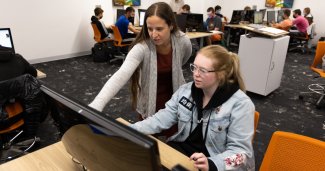
Ohio Northern University launched a new major this fall—Computer Science + X—for students who want to “super charge” their field of interest with advanced knowledge and skills in computer science.
The X stands for a major or minor of the student’s choice, said Stephany Coffman-Wolph, Ph.D., assistant professor of computer science.
“Our biggest inspiration in designing this major was the understanding that computer science is a very diverse world,” she said.
The flexible program, offered through the T.J. Smull College of Engineering, is designed to attract students from diverse academic backgrounds. The courses are catered to those seeking a less intensive alternative to traditional computer science programs.
The CS+X major is the first bachelor of arts degree offered through the College of Engineering, which had previously only offered bachelor of science degrees, according to John Estell, Ph.D., professor of computer science and computer engineering.
While most students are already familiar with basic computer programs like Word, Excel, and the Google office suite, the CS+X major will include coursework in computer programming, web development, data bases, operating systems, artificial intelligence, data structures and algorithms, and software development.
Majors will earn credits in computer science as well as completing the coursework for a major or minor in another area. Faculty will work with the students to integrate their other academic courses with computer science classes over four years.
The CS+X major can be paired with almost any other major or minor, according to Estell, giving graduates additional skills and options in their chosen career field.
For example, a history-focused graduate would be able to develop a website for a museum, or a sport management-focused graduate could oversee the ticketing platform for a professional sports team.
Art & design, marketing, and communication & media majors in particular are already aware of the value of computer science expertise in their professions, explained Coffman-Wolph, especially with the emergence of AI.
Students in every science discipline are also increasingly interesting in how emerging technologies can enhance their research—for example, through the development of computer models, according to Estell and Coffman-Wolph.
ONU plans to enroll the first cohort of students in the CS+X program in fall of 2026. While ONU is not the first university to combine computer science with another academic area in a major, ONU’s program is unique because of its smaller class size and the ability of faculty to build close relationships with students.
Both Estell and Coffman-Wolph said they are looking forward to seeing how students combine other academic areas with computer science to carve out a path to a specialized, fulfilling career.
“Students definitely have a way of surprising us sometimes,” said Coffman-Wolph. “They come up with ideas that, honestly, the rest of us wouldn’t think of.”
“It’s something brand new to ONU,” Estell said of the CS+X major. “It’s unique and gives students the opportunity to develop a program that is exactly what they are looking for,” he added.